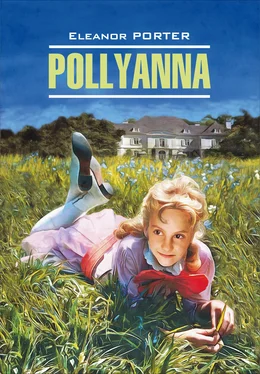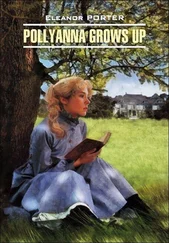“And you’ve had still another caller to-day, my dear,” announced Miss Polly, in a voice she vainly tried to steady. “Do you remember Mrs. Payson?”
“Mrs. Payson? Why, I reckon I do! She lives on the way to Mr. Pendleton’s, and she’s got the prettiest little girl baby three years old, and a boy ’most five. She’s awfully nice, and so’s her husband – only they don’t seem to know how nice each other is. Sometimes they fight – I mean, they don’t quite agree. They’re poor, too, they say, and of course they don’t ever have barrels, ’cause he isn’t a missionary minister, you know, like – well, he isn’t.”
A faint color stole into Pollyanna’s cheeks which was duplicated suddenly in those of her aunt.
“But she wears real pretty clothes, sometimes, in spite of their being so poor,” resumed Pollyanna, in some haste. “And she’s got perfectly beautiful rings with diamonds and rubies and emeralds in them; but she says she’s got one ring too many, and that she’s going to throw it away and get a divorce instead. What is a divorce, Aunt Polly? I’m afraid it isn’t very nice, because she didn’t look happy when she talked about it. And she said if she did get it, they wouldn’t live there any more, and that Mr. Payson would go ‘way off, and maybe the children, too. But I should think they’d rather keep the ring, even if they did have so many more. Shouldn’t you? Aunt Polly, what is a divorce?”
“But they aren’t going ’way off, dear,” evaded Aunt Polly, hurriedly. “They’re going to stay right there together.”
“Oh, I’m so glad! Then they’ll be there when I go up to see – O dear!” broke off the little girl, miserably. “Aunt Polly, why CAN’t I remember that my legs don’t go any more, and that I won’t ever, ever go up to see Mr. Pendleton again?”
“There, there, don’t,” choked her aunt. “Perhaps you’ll drive up sometime. But listen! I haven’t told you, yet, all that Mrs. Payson said. She wanted me to tell you that they – they were going to stay together and to play the game, just as you wanted them to.”
Pollyanna smiled through tear-wet eyes.
“Did they? Did they, really? Oh, I am glad of that!”
“Yes, she said she hoped you’d be. That’s why she told you, to make you – GLAD, Pollyanna.”
Pollyanna looked up quickly.
“Why, Aunt Polly, you – you spoke just as if you knew – DO you know about the game, Aunt Polly?”
“Yes, dear.” Miss Polly sternly forced her voice to be cheerfully matter-of-fact. “Nancy told me. I think it’s a beautiful game. I’m going to play it now – with you.”
“Oh, Aunt Polly – YOU? I’m so glad! You see, I’ve really wanted you most of anybody, all the time.”
Aunt Polly caught her breath a little sharply. It was even harder this time to keep her voice steady; but she did it.
“Yes, dear; and there are all those others, too. Why, Pollyanna, I think all the town is playing that game now with you – even to the minister [192] even to the minister – ( разг. ) все, включая священника
! I haven’t had a chance to tell you, yet, but this morning I met Mr. Ford when I was down to the village, and he told me to say to you that just as soon as you could see him, he was coming to tell you that he hadn’t stopped being glad over those eight hundred rejoicing texts that you told him about. So you see, dear, it’s just you that have done it. The whole town is playing the game, and the whole town is wonderfully happier – and all because of one little girl who taught the people a new game, and how to play it.”
Pollyanna clapped her hands.
“Oh, I’m so glad,” she cried. Then, suddenly, a wonderful light illumined her face. “Why, Aunt Polly, there IS something I can be glad about, after all. I can be glad I’ve HAD my legs, anyway – else I couldn’t have done – that!”
Chapter XXIX
Through an Open Window
One by one the short winter days came and went – but they were not short to Pollyanna. They were long, and sometimes full of pain. Very resolutely, these days, however, Pollyanna was turning a cheerful face toward whatever came. Was she not specially bound to play the game, now that Aunt Polly was playing it, too? And Aunt Polly found so many things to be glad about! It was Aunt Polly, too, who discovered the story one day about the two poor little waifs in a snow-storm who found a blown-down door to crawl under, and who wondered what poor folks did that didn’t have any door! And it was Aunt Polly who brought home the other story that she had heard about the poor old lady who had only two teeth, but who was so glad that those two teeth “hit”!
Pollyanna now, like Mrs. Snow, was knitting wonderful things out of bright colored worsteds that trailed their cheery lengths across the white spread, and made Pollyanna – again like Mrs. Snow – so glad she had her hands and arms, anyway.
Pollyanna saw people now, occasionally, and always there were the loving messages from those she could not see; and always they brought her something new to think about – and Pollyanna needed new things to think about.
Once she had seen John Pendleton, and twice she had seen Jimmy Bean. John Pendleton had told her what a fine boy Jimmy was getting to be, and how well he was doing. Jimmy had told her what a first-rate home he had, and what bang-up “folks” Mr. Pendleton made; and both had said that it was all owing to her.
“Which makes me all the gladder, you know, that I HAVE had my legs,” Pollyanna confided to her aunt afterwards.
The winter passed, and spring came. The anxious watchers over Pollyanna’s condition could see little change wrought by the prescribed treatment. There seemed every reason to believe, indeed, that Dr. Mead’s worst fears would be realized – that Pollyanna would never walk again.
Beldingsville, of course, kept itself informed concerning Pollyanna; and of Beldingsville, one man in particular fumed and fretted himself into a fever of anxiety over the daily bulletins which he managed in some way to procure from the bed of suffering. As the days passed, however, and the news came to be no better, but rather worse, something besides anxiety began to show in the man’s face: despair, and a very dogged determination, each fighting for the mastery. In the end, the dogged determination won; and it was then that Mr. John Pendleton, somewhat to his surprise, received one Saturday morning a call from Dr. Thomas Chilton.
“Pendleton,” began the doctor, abruptly, “I’ve come to you because you, better than any one else in town, know something of my relations with Miss Polly Harrington.”
John Pendleton was conscious that he must have started visibly – he did know something of the affair between Polly Harrington and Thomas Chilton, but the matter had not been mentioned between them for fifteen years, or more.
“Yes,” he said, trying to make his voice sound concerned enough for sympathy, and not eager enough for curiosity. In a moment he saw that he need not have worried, however: the doctor was quite too intent on his errand [193] was quite too intent on his errand – ( разг. ) был слишком сосредоточен на своем деле
to notice how that errand was received.
“Pendleton, I want to see that child. I want to make an examination. I MUST make an examination.”
“Well – can’t you?”
“CAN’t I! Pendleton, you know very well I haven’t been inside that door for more than fifteen years. You don’t know – but I will tell you – that the mistress of that house told me that the NEXT time she ASKED me to enter it, I might take it [194] I might take it – ( разг. ) я могу считать
that she was begging my pardon, and that all would be as before – which meant that she’d marry me. Perhaps you see her summoning me now – but I don’t!”
Читать дальше
Конец ознакомительного отрывка
Купить книгу












